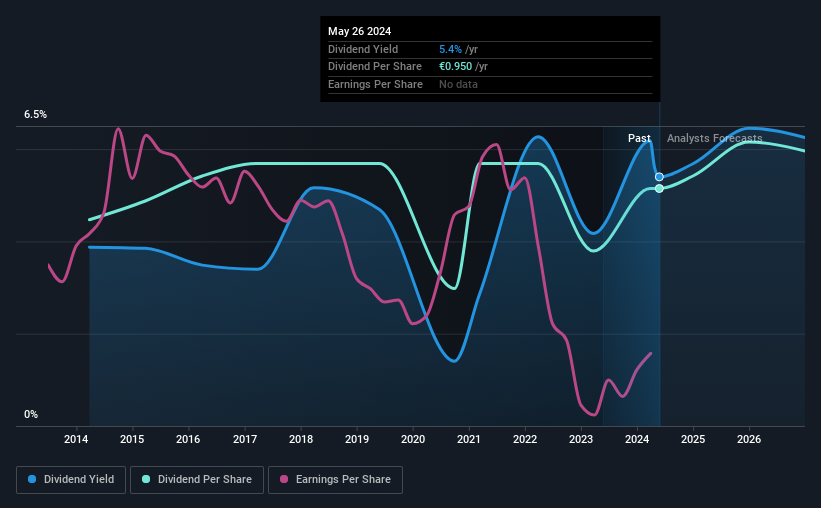- Germany
- /
- Consumer Durables
- /
- XTRA:LEI
Here's Why We're Wary Of Buying Leifheit's (ETR:LEI) For Its Upcoming Dividend

Readers hoping to buy Leifheit Aktiengesellschaft (ETR:LEI) for its dividend will need to make their move shortly, as the stock is about to trade ex-dividend. The ex-dividend date occurs one day before the record date which is the day on which shareholders need to be on the company's books in order to receive a dividend. It is important to be aware of the ex-dividend date because any trade on the stock needs to have been settled on or before the record date. Meaning, you will need to purchase Leifheit's shares before the 30th of May to receive the dividend, which will be paid on the 3rd of June.
The company's upcoming dividend is €1.05 a share, following on from the last 12 months, when the company distributed a total of €0.95 per share to shareholders. Based on the last year's worth of payments, Leifheit stock has a trailing yield of around 5.4% on the current share price of €17.60. Dividends are a major contributor to investment returns for long term holders, but only if the dividend continues to be paid. We need to see whether the dividend is covered by earnings and if it's growing.
View our latest analysis for Leifheit
If a company pays out more in dividends than it earned, then the dividend might become unsustainable - hardly an ideal situation. An unusually high payout ratio of 218% of its profit suggests something is happening other than the usual distribution of profits to shareholders. Yet cash flow is typically more important than profit for assessing dividend sustainability, so we should always check if the company generated enough cash to afford its dividend. Fortunately, it paid out only 41% of its free cash flow in the past year.
It's good to see that while Leifheit's dividends were not covered by profits, at least they are affordable from a cash perspective. Still, if the company repeatedly paid a dividend greater than its profits, we'd be concerned. Very few companies are able to sustainably pay dividends larger than their reported earnings.
Click here to see the company's payout ratio, plus analyst estimates of its future dividends.

Have Earnings And Dividends Been Growing?
When earnings decline, dividend companies become much harder to analyse and own safely. If business enters a downturn and the dividend is cut, the company could see its value fall precipitously. Leifheit's earnings per share have fallen at approximately 13% a year over the previous five years. Such a sharp decline casts doubt on the future sustainability of the dividend.
Many investors will assess a company's dividend performance by evaluating how much the dividend payments have changed over time. In the past 10 years, Leifheit has increased its dividend at approximately 1.4% a year on average.
Final Takeaway
From a dividend perspective, should investors buy or avoid Leifheit? It's not a great combination to see a company with earnings in decline and paying out 218% of its profits, which could imply the dividend may be at risk of being cut in the future. However, the cash payout ratio was much lower - good news from a dividend perspective - which makes us wonder why there is such a mis-match between income and cashflow. It's not the most attractive proposition from a dividend perspective, and we'd probably give this one a miss for now.
So if you're still interested in Leifheit despite it's poor dividend qualities, you should be well informed on some of the risks facing this stock. For example - Leifheit has 1 warning sign we think you should be aware of.
Generally, we wouldn't recommend just buying the first dividend stock you see. Here's a curated list of interesting stocks that are strong dividend payers.
New: AI Stock Screener & Alerts
Our new AI Stock Screener scans the market every day to uncover opportunities.
• Dividend Powerhouses (3%+ Yield)
• Undervalued Small Caps with Insider Buying
• High growth Tech and AI Companies
Or build your own from over 50 metrics.
Have feedback on this article? Concerned about the content? Get in touch with us directly. Alternatively, email editorial-team (at) simplywallst.com.
This article by Simply Wall St is general in nature. We provide commentary based on historical data and analyst forecasts only using an unbiased methodology and our articles are not intended to be financial advice. It does not constitute a recommendation to buy or sell any stock, and does not take account of your objectives, or your financial situation. We aim to bring you long-term focused analysis driven by fundamental data. Note that our analysis may not factor in the latest price-sensitive company announcements or qualitative material. Simply Wall St has no position in any stocks mentioned.
About XTRA:LEI
Leifheit
Produces and distributes household products in Germany, Central and Eastern Europe, and internationally.
Flawless balance sheet with proven track record and pays a dividend.
Market Insights
Community Narratives



